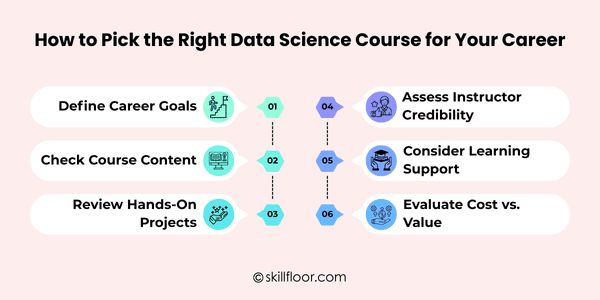Ultimate Guide to Choosing the Right Data Science Course
Confused about choosing the right data science course? Discover how to upskill smartly, and avoid costly mistakes, and future-proof your career with Skillfloor.

Everyone is becoming interested in data science: your friends, coworkers, and even LinkedIn users who did different things the previous year. Posts about high pay, career advancement, and success stories are all you see. It seems like you might lose a significant opportunity in your life if you don't start right away.
"The most attractive job of the 21st century is data science." This statement is likely familiar to you. As a result, many courses, boot camps, and diploma programs are now available online. Each platform promises significant outcomes. However, this abundance of options makes it challenging to determine which ones are truly worth your time.
The Uncomfortable Truth
This is the part that is rarely discussed. You could lose between 6 and 12 months of your life if you enroll in the incorrect data science course. You work hard, spend money, and devote your time, yet ultimately you feel stuck. This undermines your self-esteem and gradually causes you to question your own skills.
Many people have high hopes and a lot of enthusiasm when they first start. But they gradually cease after a few weeks or months. It's not because they're lazy, but rather because they're not suited for the course. Some courses don't prepare you for job duties at all, some are too basic, and some are too difficult.
Why Data Science Isn’t Just a Trend — It’s Career Insurance
Data science has evolved into more than just a trendy skill; it is increasingly becoming essential for many jobs. Companies now depend on data to enhance decision-making, reduce costs, and grow faster than ever before.
Technology is transforming every sector of the economy today. Individuals with data expertise are highly valued and often promoted to higher positions, while those without these skills may feel stuck, confused, or left behind.
1. Data in Every Industry
Nowadays, data is used in marketing to comprehend consumers, in finance to lower dangers, and in business to make more intelligent, quicker, and assured decisions.
2. Used Beyond Tech
Today, data is used on a daily basis by hospitals, schools, retail establishments, sports teams, and even small enterprises to enhance performance, save time, and prevent expensive errors.
3. Not Just for Coders
Because many office jobs now require basic data skills, you don't need to be a programmer or computer specialist to work with data.
4. Protection From Job Loss
Instead, then worrying about software or AI tools replacing your role, learning data science helps you remain valued at work.
5. Learning Is Now Required
Reskilling and upskilling are now essential if you want to remain relevant, self-assured, and valued at work. They are no longer plans for the future.
6. Your Career Safety Net
Developing your data science skills increases your career alternatives, enables greater growth, and gives you the assurance that your work will continue to be valuable even as technology advances.
Types of Data Science Courses
1. Online vs. Offline Courses
-
Online Courses: Accessible from anyplace, a flexible study schedule enables self-paced advancement and worldwide accessibility.
-
Offline Courses: Focused learning, improved networking opportunities, in-person interactions, and a structured classroom setting.
2. Bootcamps
-
Fast-paced instruction with a condensed schedule that is intended for quick mastering and skill improvement.
-
Ideal for professionals looking to quickly acquire useful data science skills or change careers.
-
Includes actual experience, real-world projects, and developing a solid portfolio.
3. University Programs / Degrees
-
Offers thorough, comprehensive instruction that covers every important data science principle.
-
Provides accredited qualifications that are useful for official work requirements and career progression.
-
Provides a solid academic foundation but comes at a higher cost and takes longer.
4. Self-Paced MOOCs (Massive Open Online Courses)
-
Makes learning accessible to everyone on the planet by providing solutions that are either free or inexpensive.
-
Gives students a flexible schedule and the freedom to advance at their own pace.
-
I need a great deal of motivation and self-control to finish classes properly and regularly.
5. Specialized Courses
-
Concentrates on specialized fields including analytics, artificial intelligence, natural language processing, and machine learning.
-
Perfect for those with basic capabilities who want to specialize and gain advanced knowledge.
6. General / Full-Stack Data Science Courses
-
Includes programming, statistics, machine learning, and visualization, among other end-to-end data science abilities.
-
Ideal for novices looking for a comprehensive road map to begin their data science adventure.
How to Pick the Right Data Science Course for Your Career
The most well-known or publicized data science course isn't always the best one. It's the one that fits the market demand, your experience level, and your professional objectives.
1. Start with Clear Career Goals
Before enrolling in any course, ask yourself:
-
Are you a beginner starting from scratch?
-
Are you a working professional upgrading your skills?
-
Are you a career switcher aiming to enter data science or analytics?
Also consider the role you’re targeting:
-
Data Analyst
-
Business Analyst
-
Machine Learning Engineer
Making your career goals clear can help you select the best course, ensuring that it fits your experience, learning requirements, and desired role.
2. Check the Curriculum: Depth Matters
A high-quality data science course must cover:
-
Python programming
-
SQL and data handling
-
Statistics and probability
-
Data visualization and storytelling
-
Machine learning fundamentals
Be careful of courses that:
-
Skip statistics or fundamentals
-
Only teach tools without concepts
-
Are too theoretical with no application
-
Haven’t updated their content to match industry needs
Python, SQL, statistics, visualization, and machine learning are all covered in a solid data science course that strikes a mix between theory and practice. It also offers practical projects and current industrial relevance.
3. Check for Hands-On Projects
Data science is a practical skill, not just a theoretical one.
A good course should offer:
-
Real-world datasets
-
Industry-style projects
-
Case studies and problem-solving exercises
-
A capstone project you can showcase in your portfolio
When looking for jobs, your portfolio is frequently more important than your certificate. Employers want evidence that you can use data to solve actual problems.

4. Assess Instructor & Platform Credibility
Not all instructors are the same.
Look for:
-
Instructors with real industry experience
-
Platforms with strong reviews and alumni success stories
-
Transparent outcomes and testimonials
-
Partnerships with companies or hiring networks (if possible)
You won't learn things from a textbook like business context, complicated data, and real-world restrictions from an educator who has worked in real data positions.
5. Consider Learning Format & Support
Ask yourself:
a. Do you learn better with self-paced content or live classes?
b. Do you need:
-
Mentorship?
-
Doubt-clearing sessions?
-
A learning community?
Many students fail not because the content is poor, but rather because they become disinterested or lose drive. In order to finish strong, support networks might be quite important.
6. Compare Cost vs. ROI
More expensive doesn’t always mean better—but free isn’t always enough.
Consider:
a. What skills you’ll gain
b. Whether the course helps with:
-
Resume building
-
Portfolio creation
-
Interview prep
-
Job referrals or placement support
Consider your course to be an investment rather than a cost. Better prospects, self-assurance, and professional advancement should result from choosing the correct one.
Why Skillfloor Is the Right Choice for Your Data Science Career
Skillfloor empowers you to build a successful data science career through practical learning, expert mentorship, career guidance, and a structured, industry-aligned program designed to take you from beginner to professional.
1. Industry-Aligned Curriculum
In order to ensure that students get the skills that companies require in real-world data science employment, our courses are created in accordance with current industry standards, covering the most pertinent tools, approaches, and frameworks.
2. Hands-On, Project-Based Learning
We place a heavy emphasis on learning by doing, providing a variety of real-world projects that enhance problem-solving abilities, develop practical experience, and build a solid portfolio that highlights your skills to potential employers.
3. Expert Mentorship
Learn directly from experts with actual industry experience who offer advice, respond to inquiries, and share insights to assist students overcome obstacles and advance their data science careers.
4. Career Guidance and Interview Preparation
In order to ensure that students are prepared to confidently join the data science job market, Skillfloor provides individualized career help, including resume development, practice interviews, and job preparation techniques.
5. Structured Learning Path
Our courses prevent overwhelm while guaranteeing thorough knowledge of crucial data science skills by guiding students from fundamental ideas to complex subjects in a systematic, step-by-step manner.
6. Community and Networking Opportunities
Students become part of a vibrant peer and alumni community that fosters networking, cooperation, and information exchange, boosting self-esteem and providing access to data science career prospects.
Choosing the best course in data science can be intimidating, but it can be a thrilling adventure with the appropriate support. Gaining skills that you can apply to real projects and developing your confidence to tackle real-world issues are the main goals of a data science course, not only studying technologies and obtaining a credential. The ideal course will help you achieve your objectives, provide you with real-world experience, and assist you at every stage. At Skillfloor, students develop in a community that promotes inquiry, teamwork, and curiosity in addition to learning. Purchasing a data science course that suits your goals will position you for long-term success and open doors to possibilities you may never have thought of.






























































